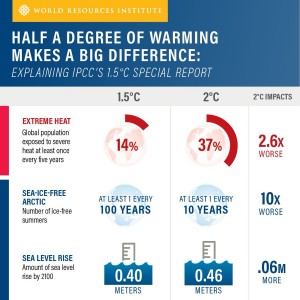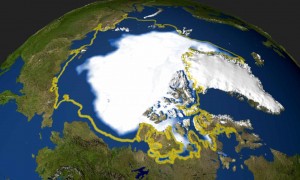News Update by Glen Besa, Virginia Sierra Club, October 7, 2018
On this October 7th, it is anticipated that the Intergovernmental Panel on Climate Change will issue its Summary for Policymakers of its Special Report on Global Warming of 1.5ºC.
This report should be a required reading for all of us, but especially for public officials, including Governor Ralph Northam, who have the authority to make policy that can reduce our carbon pollution emissions. ( Let’s add Governor Jim Justice of WV to this.)
Although the Paris Climate Accord set a goal of keeping the global average temperature increase below 2ºC, that agreement also acknowledged that countries should actually strive to limit that increase to 1.5ºC to minimize the harm done by global warming.
Climate science has advanced since the 2015 UN climate conference in Paris. Climate scientists realize that the 1.5ºC target should no longer be just aspirational if we are to avoid unacceptable consequences of a warming climate. Our own anecdotal experiences with extreme weather events, sea level rise and the shrinking arctic ice associated with the current 1ºC increase make it clear that we have no time to spare in moving away from fossil fuels and taking other bold action to reduce greenhouse gases.
The Intergovernmental Panel on Climate Change (IPCC) is the international body charged by the United Nations with assessing the science related to climate change. The IPCC was set up in 1988 to provide policymakers with regular assessments of the scientific basis of climate change, its impacts and future risks, and options for adaptation and mitigation.
Vox recently reported on a leaked copy of the draft IPCC report’s findings “that it would take a massive global effort, far more aggressive than any we’ve seen to date, to keep warming in line with 1.5°C — in part because we are already en route to 3°C of warming. And even if we hit the 1.5°C goal, the planet will still face massive, devastating changes.”
In anticipation of the issuance of the IPCC report, Auden Schendler and Andrew P. Jones commented on the findings in a column this weekend in the New York Times entitled: Stopping Climate Change Is Hopeless. Let’s Do It. – It begins with how we live our lives every moment of every day.
The column is an answer to, albeit not a direct acknowledgement of, the news last week out of the Trump Administration justifying its abandoning climate protection measures. The draft statement by the National Highway Traffic Safety Administration justifying President Trump’s decision to reverse federal fuel-efficiency standards for cars and light trucks argued that with a 4ºC increase by 2100 already cooked into the climate, “the planet’s fate is… sealed.”
Rather than accept the hope-extinguishing approach of a cynical Trump Administration, Schendler and Jones issue a call to action for leaving most the remaining coal, gas and oil in the ground. Citing historical examples of humankind overcoming great odds, they quote journalist I.F. Stone who said: “The only kinds of fights worth fighting are those you are going to lose because somebody has to fight them and lose and lose and lose until someday, somebody who believes as you do wins.” At this point, we have no more time to lose!
The immensity and immediacy of issues like the #metoo and #blacklivesmatter movements and the everyday mayhem emanating the Trump Administration make it hard to focus on problems, however important, that it would seem could be put off to another day. But after 30 years plus of opposition and obfuscation by the fossil fuel industry and its allies in both the Republican and Democratic parties, there is no more time for delay on efforts to address climate change.
While well intended, Governor Northam’s recently announced climate initiatives to look at possible actions to address climate polluting emissions from cars and trucks and fracked gas infrastructure are far too modest. The Governor’s directive to reduce emissions from fossil fuel power plants is more significant, yet will take decades to reverse the harm done to our climate by the two fracked-gas pipelines he supports.
Taking Governor Northam at his word that he sincerely wants to implement meaningful actions to address climate change, the Intergovernmental Panel on Climate Change’s Summary for Policymakers of its Special Report on Global Warming of 1.5ºC should be a call to action for real, immediate and significant efforts within the Governor’s authority to reduce greenhouse gas emissions. Those actions should start, but not end, with shutting down the Atlantic Coast and Mountain Valley Pipelines.
Here’s hoping that Governor Northam and everyone else take the time to read the IPCC’s new report and then do what is within their power to reduce the greenhouse gas pollution that is choking our planet Earth.
#########################
 IPCC climate change report calls for urgent action to phase out fossil fuels
IPCC climate change report calls for urgent action to phase out fossil fuels
UN’s Intergovernmental Panel on Climate Change says coal-fired electricity should end by 2050 if we are to limit global warming rises to 1.5C
Helen Davidson, The Guardian, 10/7/18


{ 1 comment… read it below or add one }
New research, described last month in Scientific American, demonstrates that climate scientists, far from exaggerating the threat of climate change, have underestimated its pace and severity.
To project the rise in the global mean temperature, scientists rely on complicated atmospheric modelling. They take a host of variables and run them through supercomputers to generate, say, ten thousand different simulations for the coming century, in order to make a “best” prediction of the rise in temperature.
When a scientist predicts a rise of two degrees Celsius, she’s merely naming a number about which she’s very confident: the rise will be at least two degrees. The rise might, in fact, be far higher.